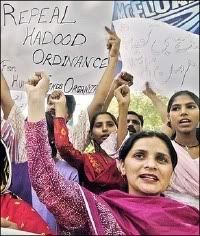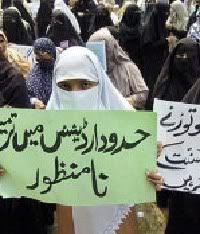 The women’s protection bill of Pakistan — which will dramatically alter the rape laws of Pakistan — has a chance of being passed this coming Monday. The bill is an attempt to reform the draconian rape laws of Pakistan from 1979, passed by then dictator Zia ul Haq under the auspices of the religious establishment (part of the hudood ordinance).
The women’s protection bill of Pakistan — which will dramatically alter the rape laws of Pakistan — has a chance of being passed this coming Monday. The bill is an attempt to reform the draconian rape laws of Pakistan from 1979, passed by then dictator Zia ul Haq under the auspices of the religious establishment (part of the hudood ordinance).


This has been a contentious issue in Pakistan (see my commentary on it here). I have been in correspondence with individuals who are involved in the Women’s Protection Bill. While on one hand they have had to contend with the religious establishment, they have also ran into opposition by some liberal groups, and international NGO’s like Human Rights Watch, who find the proposed amendments inadequate.
What the reformists are trying to explain, however, is that while total repeal of the bill would be wonderful, politics is a process, and that means taking whatever progress that can be gotten right now. While concerns about the fact that the bill is being pushed through by a dictator (Musharraf) are valid, they are unfair in light of the tremendous abuses that will be alleviated if this bill is passed. In the short term, the reformists — and those backing the bill — need our support. Later, more progress can be made.
In an op-ed that appeared in The Daily Times today (10 September, 2006) Feisal Naqvi points out:
…the response from women’s groups to the proposed Women’s Protection Act has either been hostile or at best, tepid. Instead of supporting the bill, women’s groups have only reiterated their demand for the complete repeal of the Hudood Ordinance. What these groups forget is that politics is the art of ‘the possible’. The Women’s Protection Act may not be perfect but it will certainly bring relief to millions of oppressed women. In any event, the fight for repeal can always be carried on later.
The reformists need to be recognized for the good they have achieved despite the enormous difficulties, and not to be criticized for what they have failed to achieve. The full article by Feisal Naqvi in The Daily Times is worth a read because it clearly explains what the issues are and how they are being dealt with in the new law. It concludes:
If all goes according to the government’s plan, much of what is undesirable in the Offence of Zina (Enforcement of Hudood) Ordinance, 1979 (to give the law its full name) will be quietly gutted through the proposed Protection of Women’s Act… The proposed law marks the absolute limit of what is possible in terms of today’s political climate. More importantly, the Protection of Women’s Act is not a whitewash job: instead, it addresses and fixes the major sources of women’s oppression under the Hudood Ordinance.
The best thing to do right now is to support the efforts of the reformists and later carry their torch further. It would be a terrible tragedy if after decades of efforts the amendments were tabled due to inadequate support by progressives. Well intentioned people around the world need to express their support. (For more see: ‘The Right To Own Women’ and Women’s Protection Bill Cheat Sheet). [Also see earlier ATP Poll on related issue].
Ali Eteraz describes himself as “a continental philosopher, essayist, novelist, student of Islamic arts, philosophy, jurisprudence and a practitioner of global nomadism” and blogs under this pseudonym at Eteraz, where you will find much on this and related subjects.




















































Adnan,
[quote post=”297″]May Allah increase your ignorance further-Ameen[/quote]
This is one sarcastic remark. Usually used by people who do not have valid arguments to support their claims.
Umera one point which was the main was raised by opononents of hudood laws was that more women were punished than men though statistics say otherwise.What do you say about it?
You have a blog and what you have posted above deserves a space on your blog
Bilal please be clear that I have NO intention to use others space to share my thoughts.I was kept being asked that how that old hudood law is bad and new is not,therefore I had to elaborate it but I as a member who is with this site since beginning respect the rules of ATP and will delibrately not violate it.
[quote post=”297″]hat is/are the problem with Hudood (Enforcement of Ordinance) Ordinance, 1979[/quote]
I Replied clearly.The problem is not law but its application and the people who are responsible to impose any law in state.
[quote post=”297″]you actually don’t know why this specific piece of legislation generates so much controversy and debate.[/quote]
I also cleared that.You haven’t been following my thread since beginning.Check the very first post of mine which was asnwered by Bilal.Its all drama nothing else to create confusion among pakistanis who are not well aware of their own religion.It has nothing to do with women protection anyway.I also mentioned 6 points raised by religious people(not MMA) which was not touched by Shahrukh KHan’s fan Kashmala Tariq who was the orignal author of new law.
Still I respect and would like to learn what I dont know and what is actual controversary which you are aware and many are not.Waiting for your response
Adnan, if you had actually read what I had written was about sterotyping and not about your belief. My comment was followed by
[quote comment=”2401″]I hit the submit bottom before I could complete, but, the last sentences was suppose to read:
“generalisation is amazing isn’t it – I can make anyone a culprit by putting them in small groups? Hopefully, that should make people think before they start putting people in boxes”[/quote]
But I guess it is easier to preach then practice.
Once you again you have failed to answer the question I asked “what is/are the problem with Hudood (Enforcement of Ordinance) Ordinance, 1979?” I was not asking about the general state of lawlessness or lack of enforcement or a narration on need for amendment of laws. I asked a very specific question; which was: what is wrong with this particular piece of legislation. I guess you did not read that question as well or maybe, God forbid, you actually don’t know why this specific piece of legislation generates so much controversy and debate.
Ali Eteraz who wrote this piece has an update to it on his site which you may also be interested in seeing (here).
It also quotes from an email from an activist working for the passage of the bill, which makes interesting reading no matter which side of the argument you are on: